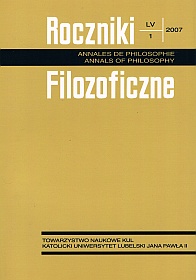Formal Logic or Formal Logics?
Abstract
Apart from putting the theses contained in E. Agazzi’s work Why Is It Logical to Admit Several Logics? in an order and making them more distinct, an attempt is made to draw conclusions from the explicit wordings used by that author. Some theses presented in the text are shown against the views of other authors who discussed analogous problems. In this way, as it seems, modification, completing and elaborating has been possible of wordings that approve of the thesis about the existence of many logics that are contained in the analyzed text.
Among others, the article emphasizes that Agazzi’s pronouncements about relations existing between standard logic and intuitionist logic cannot be accepted. Also, several remarks are made about the so-called many-valued logics. Agazzi’s theses that well constructed non-classical logics representing proper contents are necessary for representatives of various branches of knowledge is acceptable.
References
Agazzi E.: Why Is It Logical to Admit Several Logics?, [w:] P. Weingartner (ed.), Alternative Logics. Do Sciences Need Them?, Berlin–Heidelberg–New York: Springer 2004, s. 3-26.
Ajdukiewicz K.: Zarys logiki, Warszawa: PZWS 1960.
Ajdukiewicz K.: Zmiana i sprzeczność, [w:] Język i poznanie, tom II, Warszawa: PWN 1985, s. 90-106.
Borkowski L.: Kilka uwag o zasadzie dwuwartościowości i logikach wielowartościowych, „Roczniki Filozoficzne” 29 (1981), z. 1, s. 9-14.
Borkowski L.: Wprowadzenie do logiki i teorii mnogości, Lublin: TN KUL 1991.
Czernecka B.: Kilka uwag o przedmiocie logiki intuicjonistycznej, „Roczniki Filozoficzne” 49 (2001), z.1, s. 151-165.
Czeżowski T.: Logika, Warszawa: PWN 1968.
Gregorczyk A.: Nieklasyczne rachunki zdań a metodologiczne schematy badania naukowego i definicje pojęć naukowych, „Studia Logica” 20 (1967), s. 117-130.
Henderson G. P., Lemmon E. J.: Is there only One Correct System of Modal Logic?, „Aristotelian Society Suppl.” 33 (1959), s. 24-56.
Heyting A.: Intuitionism. An Introduction, Amsterdam: North-Holland Pub. Co. 1966.
Kiczuk S.: [Rec.:] John Woods, Douglas Walton, Argument: the Logic of the Fallacies, Toronto – Montreal – New York 1982, „Roczniki Filozoficzne” 32 (1984), z. 1, s. 218-221.
Kiczuk S.: Przedmiot logiki formalnej oraz jej stosowalność, Lublin: RW KUL 2001.
Kotarbiński T.: Wykłady z dziejów logiki, Warszawa: PWN 1985.
Kraszewski Z.: Logika – nauka rozumowania, Warszawa: PWN 1975.
Miller A.: [Rec.:] W. Künne, Conceptions of Truth, Oxford 2003, „Mind” 114 (2005), No. 453, s. 173-178.
Quesada F. M.: Does Metaphysics Need a Non-Classical Logic?, [w:] P. Weingartner (ed.), Alternative Logics. Do Sciences Need Them?, Berlin–Heidelberg–New York: Springer 2004, s. 28-39.
Quine W. V. O.: Filozofia logiki, tł. H. Mortimer, Warszawa: PWN 1977.
Regner L.: Logika, Kraków: PTT 1973.
Russell B.: Wstęp do filozofii matematyki, tł. Cz. Znamierowski, Warszawa: PWN 1958.
Sobociński B.: In Memoriam Jan Łukasiewicz, „Philosophical Studies” 6 (1956), s. 4-49.
Stępień A. B.: Teoria poznania, Lublin: TN KUL 1971.
Theron S.: The Interdependence of Semantics, Logic and Metaphysics as Exemplified in Aristotelian Tradition, „International Philosophical Quarterly” 42 (2002), nr 1 (165), s. 63-91.
Copyright (c) 2007 Roczniki Filozoficzne

This work is licensed under a Creative Commons Attribution-NonCommercial-NoDerivatives 4.0 International License.





